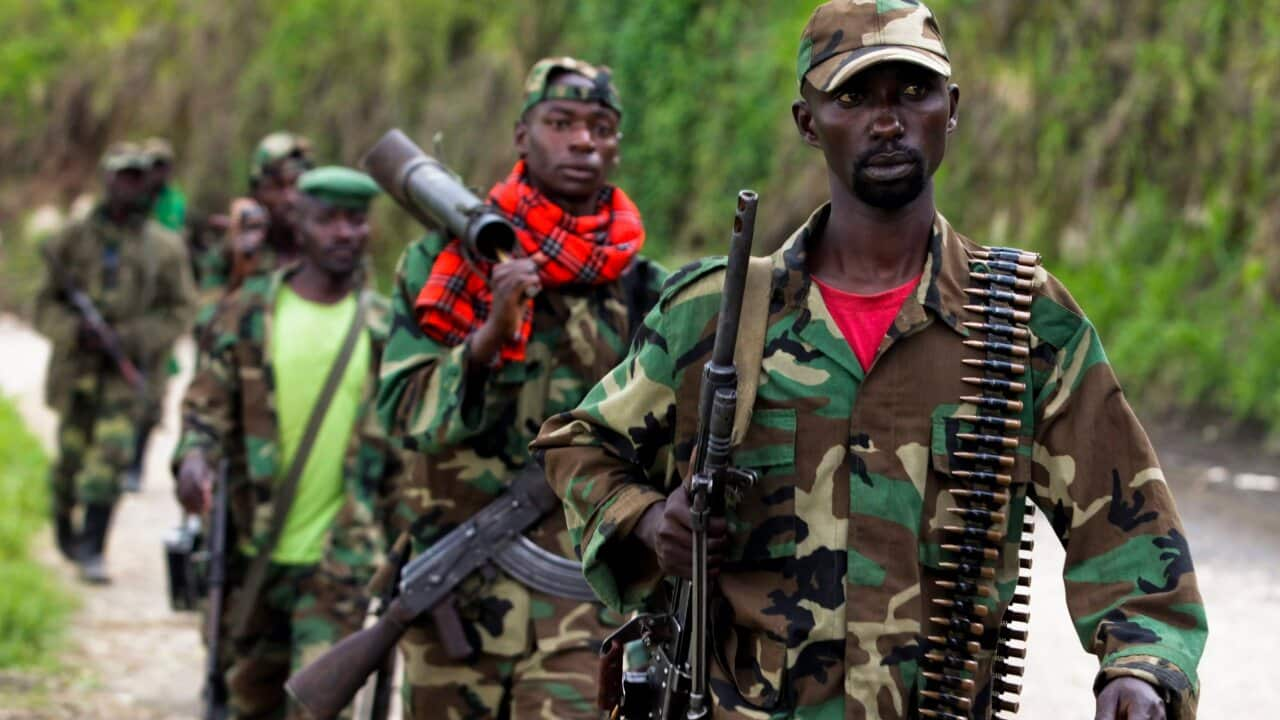(Transcript from World News Australia Radio)
M23 rebels in the Democratic Republic of Congo have announced that they will be laying down their arms.
The M23 group has waged an insurgency in the east of DRC since last year.
As Santilla Chingaipe reports, the announcement brings hope of lasting peace in the war ravaged central African nation.
(Click on audio tab above to listen to this item)
M23 comprises army mutineers who were once members of an ethnic Tutsi rebel force, the National Congress for the Defence of the People.
They were integrated into the regular army as part of a peace deal on March 23, 2009 - from which they gained their name.
But they mutinied in April last year, demanding better pay and a full implementation of the March 23rd peace deal.
An insurgency launched by the mutineers forced an estimated 800-thousand people from their homes.
The group has been accused by the United Nations and others of carrying out human rights abuses including rape, murder and recruiting child soldiers.
In a statement, M23 has declared an end to its 18-month insurgency, promising to lay down its arms, and to pursue a political solution to end the crisis in the east of the country.
The declaration was issued hours after government forces backed by United Nations troops drove the rebels out of their last two strongholds.
It followed a rapid advance in recent weeks that cornered the insurgents in hills along the border with Uganda and Rwanda.
The group's deputy spokesman Lawrence Kanyuka has confirmed the news to Ugandan television network NTV.
"We put a statement out there saying we were ending all hostilities and we are giving a chance to the political solution to be found on this crisis at the moment. Because as it's been requested of the M23, to actually dispose of the arms. What happened is we actually signed a ceasefire a long time ago, but what was happening was we were actually defending ourselves all the time. We were being attacked by the FARDC, which is the Congolese national army."
UN spokesman, Farhan Haq says the international community has welcomed the announcement.
"The Secretary-General's Special Envoy for the Great Lakes Region Mary Robinson and his Special Representative for the Democratic Republic of the Congo, Martin Kobler, together with the envoys of the African Union, the European Union, and the United States welcomed the announcement of the M23 to end its rebellion and the commitment of the Government of the DRC to end combat and complete steps agreed to as part of the Kampala Dialogue."
United States special envoy to the Great Lakes region, Russ Feingold, says the news is an important step.
"But it is obviously promising. It is unfortunate that these events had to occur in the first place. A lot of people suffered. A lot of people died as a result of this. We can't minimise that. But in a region that has suffered so much this is certainly a significant positive step in the right direction that has to be followed by the disarming and demobilisation of the other armed groups and a broader political dialogue. Under the auspices of the framework for hope, for hope led by African nations, this is only the beginning of the legitimate peace and development process but it is a valuable beginning."
Eastern DRC has been plagued by conflict for nearly two decades, which has left an estimated six million people dead.
Much of that has been fuelled by competition for the region's gold, copper and cobalt as well as cross-border ethnic tensions.
Fighting began after ethnic Hutu militias fled across the border from Rwanda after carrying out a genocide against Tutsis and moderate Hutus.
The Tutsis who formed the National Congress for the Defence of the People - later to become the M23 - took over large parts of the eastern DRC.
The United Nations and other rights groups have accused Rwanda and Uganda of supporting the M23 since its formation last year, although both governments deny the allegations.
The US and other donors have cut aid to Rwanda over the claims.
M23 spokesman Lawrence Kanyuka has rejected suggestions the group was backed by foreign governments.
"I'm not going to accept that. The Congolese don't have any strength to support themselves? They don't have the strength to fight against themselves and still having support for some of the people? This is insulting our parents, insulting ourselves, because we are Congolese. We see somthing which is not correct, which is not right we ask them actually, this is not right. this is our government, this is the entire Congolese problems. That's why we are here with the entire Congolese government to discuss with them."
Experts say the real test now will be whether the M23 rebels and government both cease their military activities and sit at the negotiating table to work out a political deal.
US envoy Russ Feingold says many of the M23 rebels could be reintegrated into the army as part of an amnesty with the government.
But he says those reponsible for carrying out war crimes must be brought to account.
"They need to face accountability, they need to face justice. This is first and foremost up to the nation of the Democratic Republic of the Congo and all of us, the international community and others will do whatever they wish to assist them in the appropriate procedure of bringing these individuals to justice and proper prosecution and punishment for crimes."
While the M23 rebellion monopolised the headlines on conflict in eastern DRC for over a year, some 20 other armed groups continue to operate in the area.
Share

